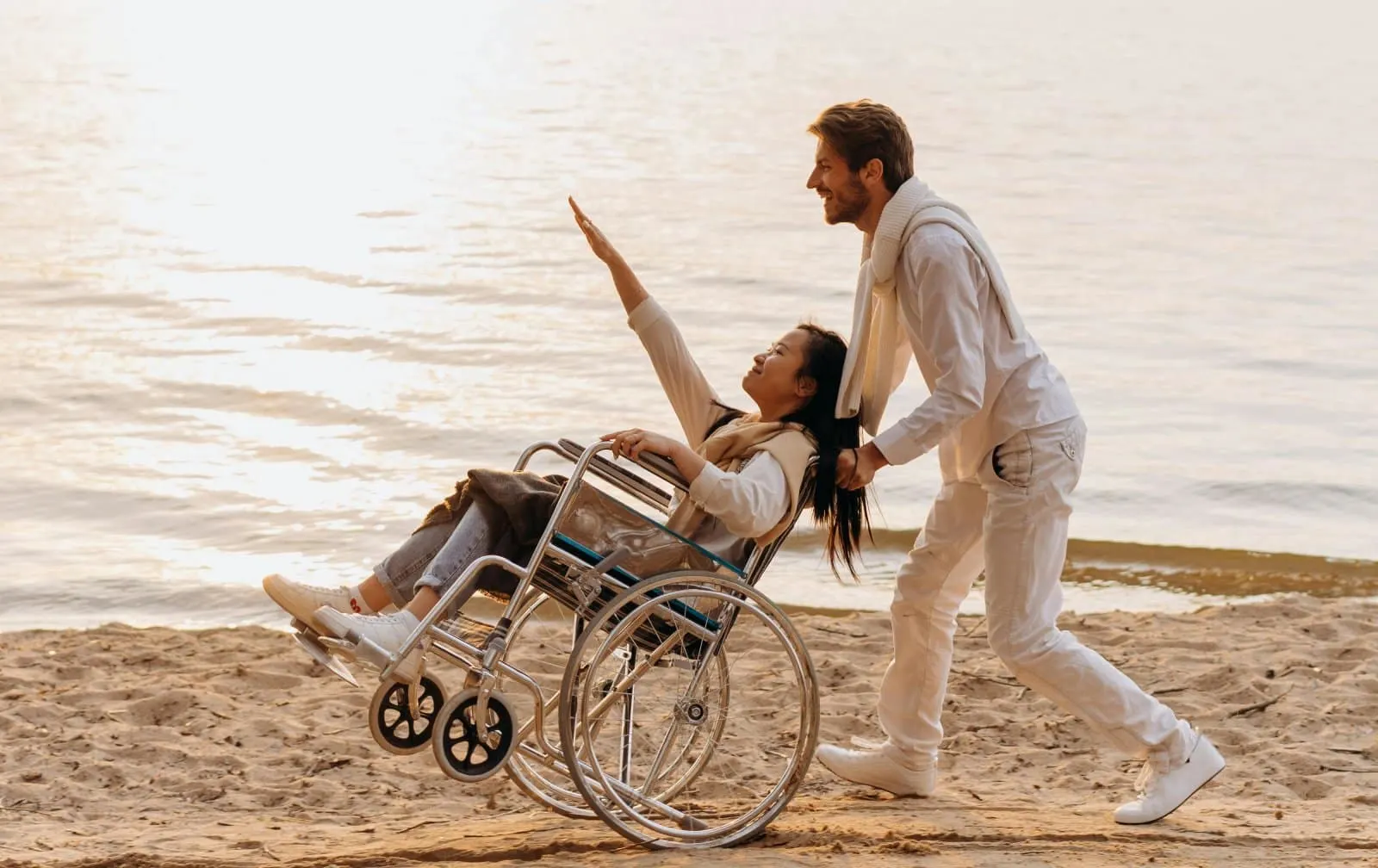Traveling with disabilities can present unique challenges, but the world can be your oyster with the right planning and resources. This guide is designed to help travelers with disabilities navigate various aspects of traveling, from transportation to accommodation, ensuring a smooth and enjoyable experience. Whether planning a city break, a beach holiday, or an adventure trip, these tips will help you make the most of your travels.
1. Planning and Research

Image Credit: Shutterstock / Ground Picture
Embarking on a journey with a disability necessitates meticulous planning, a step that can make all the difference. Dive into detailed research about your destination, focusing on accessibility. This includes understanding the layout of the city, the nature of public transportation, and the accessibility features of attractions you plan to visit.
Websites, travel blogs, and forums dedicated to accessible travel can be invaluable resources. Additionally, reaching out to local disability organizations for insights can provide practical, on-the-ground information that might not be readily available online.
Insider’s Tip: Use Google Street View to virtually explore the area around your accommodation and check for potential obstacles.
2. Choosing the Right Accommodation

Image Credit: Pexels / Quang Nguyen Vinh
Selecting the right accommodation is crucial. Beyond just checking the box for ‘accessible rooms,’ explore the specifics: Does the bathroom have a roll-in shower? Are there grab bars near the toilet and shower? Is the room door wide enough for your mobility device? Direct communication with the hotel can clarify these details. Remember, ‘accessible’ can mean different things in different places.
Insider’s Tip: Request a room close to the elevator to minimize the distance you need to travel within the hotel.
3. Accessible Transportation

Image Credit: Shutterstock / Roman Zaiets
Navigating transportation is a key aspect of your travel. Many cities now offer accessible public transportation options, but these can vary widely in terms of availability and convenience.
Research in advance about accessible buses, trains, and taxis. Sometimes, renting a vehicle adapted to your needs might be a better option. Always confirm accessibility features and make reservations in advance where possible.
Insider’s Tip: Download apps for local public transportation systems, as they often have accessibility information and real-time updates.
4. Travel Insurance

Image Credit: Shutterstock / amedeoemaja
Securing comprehensive travel insurance is non-negotiable. Ensure that your policy covers your specific needs, including coverage for any medical equipment you’re traveling with and potential medical care at your destination. Understanding the fine print of what is covered is crucial, especially concerning pre-existing conditions or activities you plan to undertake.
Insider’s Tip: Keep a copy of your insurance policy on you and have a digital copy accessible on your phone. Purchase travel insurance as soon as you book your trip to ensure coverage for any unforeseen circumstances leading up to your departure.
5. Packing Essentials

Image Credit: Shutterstock / New Africa
Packing for travel with disabilities requires thoughtful consideration. Prioritize essential medical supplies, extra medication, and any specialized equipment you might need. A repair kit for mobility aids can be a lifesaver. Pack these essentials in your carry-on luggage to ensure they are readily available, especially in the event of checked luggage delays or loss.
Insider’s Tip: Label all your equipment and medical supplies clearly, and carry a doctor’s note for medications and medical devices.
6. Airport Accessibility

Image Credit: Shutterstock / Bignai
Airports can be sprawling and overwhelming, but being aware of the available accessibility services can make your experience smoother. Most airports offer assistance services, including help with check-in, security, and boarding. It’s essential to inform the airline and airport about your specific needs well before your travel date to ensure these services are available and tailored to your requirements.
Insider’s Tip: Request an aisle seat close to the restroom if needed, and consider early boarding to ease the process.
7. Accessible Activities and Attractions

Image Credit: Shutterstock / DyziO
Many tourist attractions have made significant efforts to improve accessibility. Research and plan for accessible activities and attractions at your destination. This might include guided tours specifically catering to travelers with disabilities. Don’t hesitate to contact tour operators directly to discuss your needs and confirm accessibility details.
Insider’s Tip: Look for attractions that offer free admission for caregivers or companions.
8. Dining Out

Image Credit: Shutterstock / CREATISTA
Exploring the culinary delights of your destination should be a seamless experience. Research accessible restaurants and cafes in advance, considering both the physical accessibility of the venue and the suitability of the menu for any dietary restrictions. Many restaurants now offer accessible seating and restroom facilities, but it’s always best to confirm in advance.
Insider’s Tip: Call ahead to reserve an accessible table, especially in busy restaurants or during peak dining times.
9. Emergency Preparedness

Image Credit: Shutterstock / Kmpzzz
Being prepared for emergencies is crucial. Carry a list of emergency contacts, including local emergency services and your country’s embassy or consulate. Familiarize yourself with the location of the nearest hospital or medical facility at your destination. It’s also wise to have a basic understanding of the local language for emergencies or at least have key phrases written down or saved on your phone.
Insider’s Tip: Carry a personal medical information card that details your condition, medications, allergies, and emergency contacts.
10. Networking and Support

Image Credit: Shutterstock / Vital9s
Building a network with other travelers who have disabilities can provide valuable insights and support. Online communities and forums offer a platform to share experiences, tips, and advice. These networks can also offer emotional support, making your travel experience more enriching and less daunting.
Insider’s Tip: Join online communities or forums specific to your type of disability for tailored advice and support.
The Bottom Line

Image Credit: Pexels / Mikhail Nilov
Traveling with disabilities may require extra planning and preparation, but it should not deter you from exploring the world. You can enjoy a fulfilling and hassle-free travel experience with the right approach. Remember, accessibility continually improves globally, opening up more opportunities for everyone to travel. Embrace these tips, stay informed, and most importantly, enjoy the journey and the unique experiences it brings.
More Articles Like This…
Barcelona: Discover the Top 10 Beach Clubs
2024 Global City Travel Guide – Your Passport to the World’s Top Destination Cities
Exploring Khao Yai 2024 – A Hidden Gem of Thailand
The post Empowering Accessible Travel: 10 Essential Tips for People With Disabilities republished on Passing Thru with permission from The Green Voyage.
Featured Image Credit: Shutterstock / Zamrznuti tonovi.
For transparency, this content was partly developed with AI assistance and carefully curated by an experienced editor to be informative and ensure accuracy.
Tips for Trip Success
Book Your Flight
Find an inexpensive flight by using Kayak, a favorite of ours because it regularly returns less expensive flight options from a variety of airlines.
Book Your Hotel or Special Accommodation
We are big fans of Booking.com. We like their review system and photos. If we want to see more reviews and additional booking options, we go to Expedia.
You Need Travel Insurance!
Good travel insurance means having total peace of mind. Travel insurance protects you when your medical insurance often will not and better than what you get from your credit card. It will provide comprehensive coverage should you need medical treatment or return to the United States, compensation for trip interruption, baggage loss, and other situations.Find the Perfect Insurance Plan for Your Trip
PassingThru is a participant in the Amazon Services LLC Associates Program. As an Amazon Associate I earn from qualifying purchases.
To view PassingThru’s privacy policy, click here.
